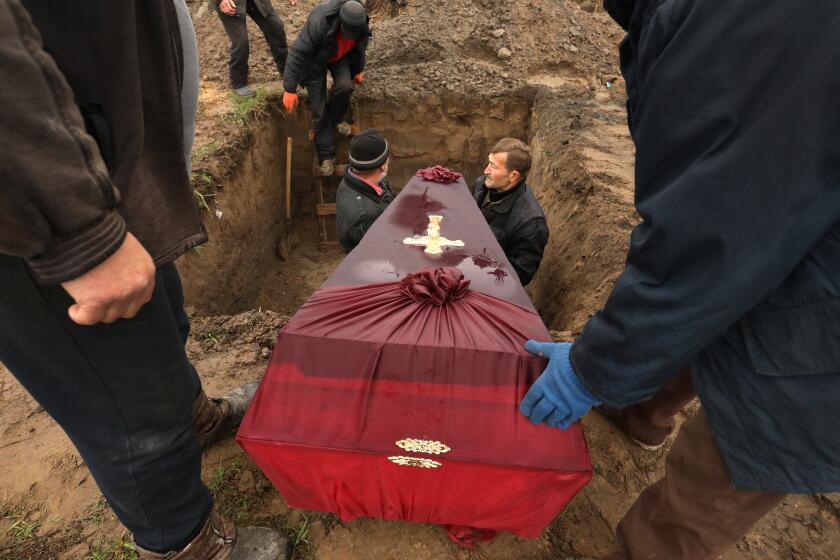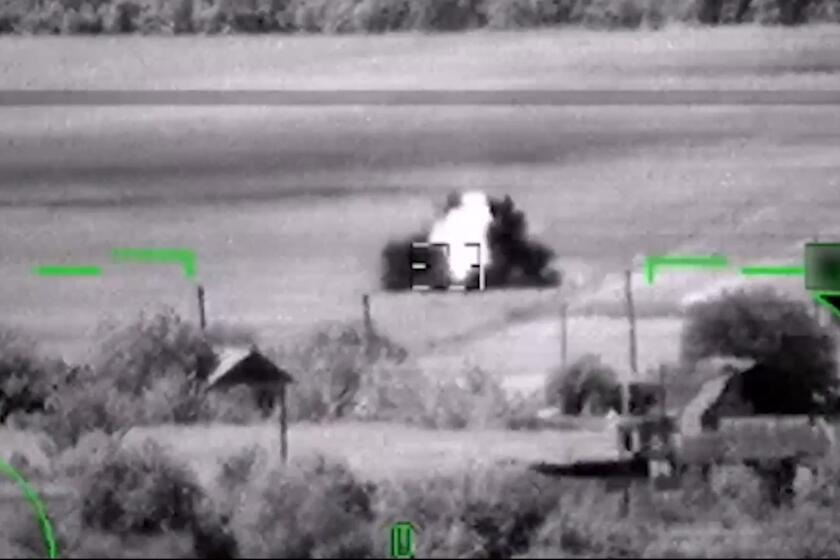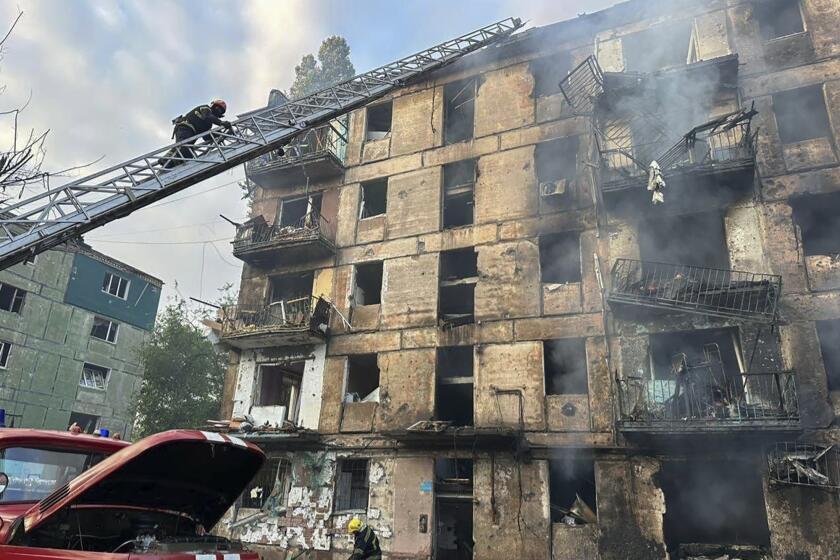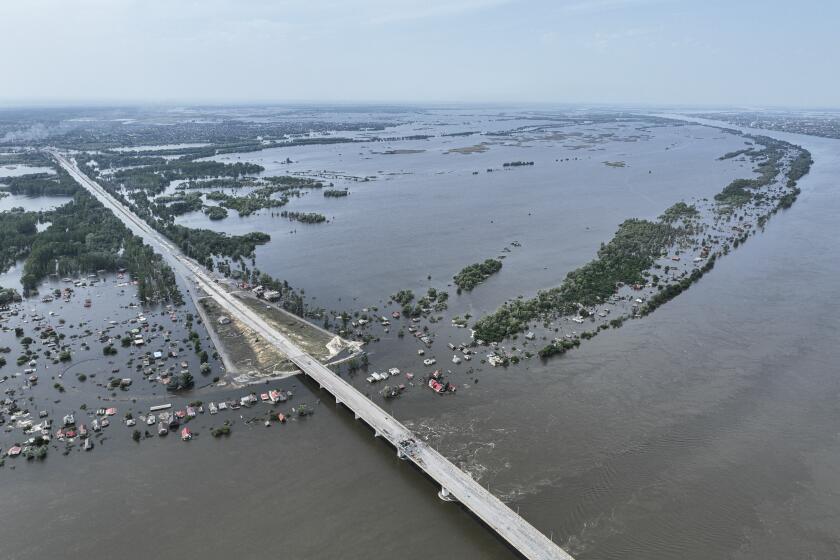Missiles target Kyiv as African leaders push Ukraine and Russia for peace and grain
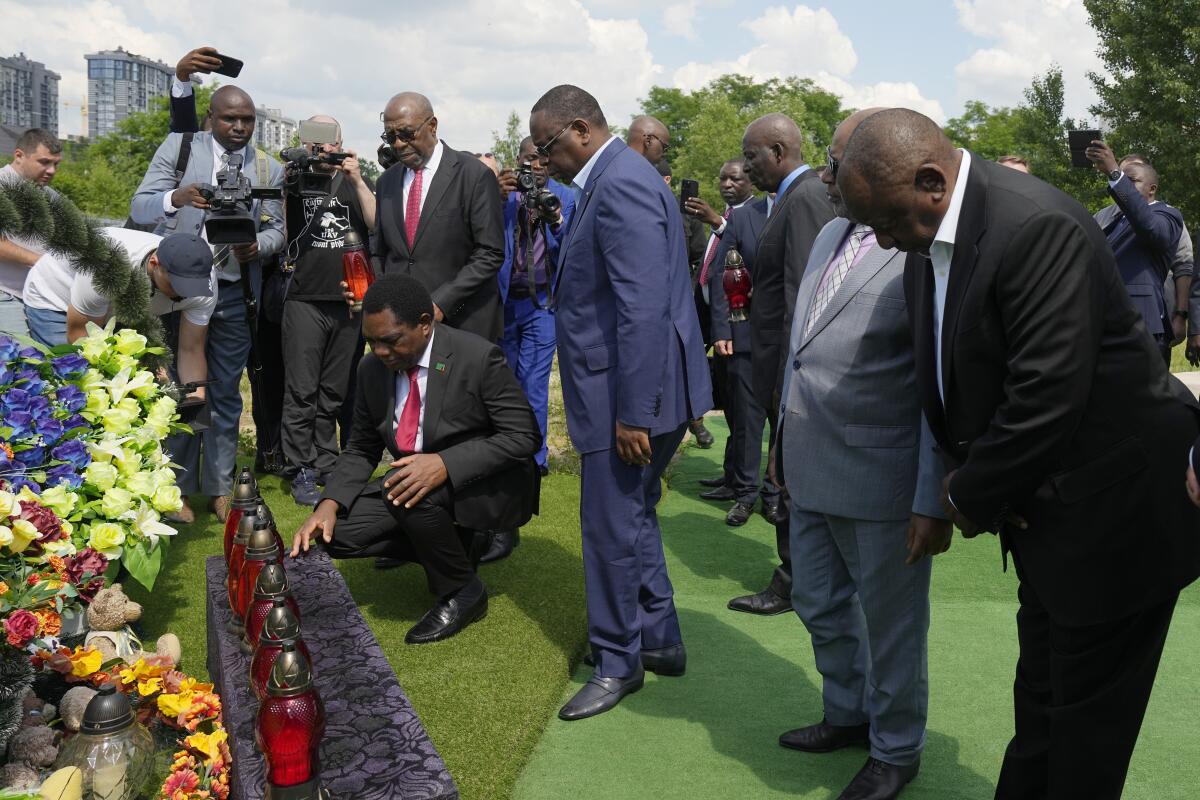
- Share via
KYIV, Ukraine — Ukrainian President Volodymyr Zelensky appealed to a group of African leaders to ask his Russian counterpart, Vladimir Putin, to free political prisoners from Crimea and beyond — saying it could be an important part of their trip to Russia on Saturday.
Seven African leaders — presidents of Comoros, Senegal, South Africa and Zambia, as well as Egypt’s prime minister and top envoys from the Republic of Congo and Uganda — visited Ukraine on Friday as part of a self-styled “peace mission” to both Ukraine and Russia to try to help end their nearly 16-month-old war.
The African leaders were traveling to meet with Putin on Saturday in the Russian city of St. Petersburg.
The mission to Ukraine, the first of its kind by African leaders, comes in the wake of other peace initiatives such as one by China, and it carried extra importance for the African countries: They rely on food and fertilizer deliveries from Russia and Ukraine, whose war has impeded exports from one of the world’s most important breadbaskets.
“This conflict is affecting Africa negatively,” South African President Cyril Ramaphosa said at a news conference alongside Zelensky and the four other African heads of state or government, after the leaders met for closed-door talks Friday afternoon.
Ramaphosa and others acknowledged the intensity of the fight and the animosity between Russia and Ukraine, but insisted all wars must come to an end — and that the delegation wants to help expedite that.
“I do believe that Ukrainians feel that they must fight and not give up. The road to peace is very hard,” he said, adding that “there is a need to bring this conflict to an end sooner rather than later.”
The delegation represents a cross section of African views about the war. South Africa, Senegal and Uganda have avoided censuring Moscow for the conflict, while Egypt, Zambia and Comoros voted against Russia last year in a United Nations General Assembly resolution condemning its invasion. Many African nations have long had close ties with Moscow, dating back to the Cold War, when the Soviet Union supported their anti-colonial struggles.
Russian President Vladimir Putin’s KGB years in East Germany offer a window into his crackdown on protests, war on Ukraine and yearning for empire.
The tenor of the news conference soured when Comoros President Azali Assoumani floated the idea of a “road map” to peace, prompting questions from Zelensky, who sought a clarification and insisted he didn’t want “any surprises” from their visit with Putin.
Zelensky then urged them to help free political prisoners from Crimea, which Russia illegally annexed in 2014.
“Would you please ask Russia to liberate the political prisoners?” Zelensky said. “Maybe this will be an important result of your mission, of your ‘road map’.”
Zelensky expressed thinly veiled frustration about their trip, saying they would have “conversations with the terrorists” on Saturday.
International human rights organizations say Russia has targeted the Crimean Tatar ethnic group with arbitrary detentions and unjustified prosecutions since Russia illegally annexed Crimea in 2014. Many have been sentenced to lengthy prison terms.
“The Russian Federation misuses its legislation for political purposes, in particular to suppress the nonviolent struggle of the Crimean Tatars and their protest against the occupation of Crimea,” the Crimean Tatar Resource Center said in a statement last year.
Ramaphosa, who laid out 10 priorities to help pave the way to ending the war, said he planned to have a bilateral meeting with Putin in part to discuss the Russian leader’s possible attendance at a planned August summit, hosted by South Africa, of the so-called “BRICS” countries, which also include Brazil, China and India.
The International Criminal Court in March issued an international arrest warrant against Putin over Russian abductions of Ukrainian children, which could complicate any trip by Putin to South Africa. Ramaphosa said he alone would decide whether to invite the Russian leader, saying it was still “under consideration.”
Russian atrocities number in the tens of thousands, Ukraine says. The ICC wants to arrest Putin. But what are the prospects for justice?
Before meeting with Zelensky, the African leaders went to Bucha, a Kyiv suburb where bodies of civilians lay scattered in the streets last year after Russian troops abandoned a campaign to seize the Ukrainian capital and withdrew from the area.
The delegation’s stop in Bucha was symbolically significant, as the town’s name has come to stand for the brutality of Moscow’s February 2022 invasion of Ukraine. The Russian occupation of Bucha left hundreds of civilians dead in the streets and in mass graves. Some showed signs of torture.
While in Bucha, the visitors placed commemorative candles at a small memorial outside St. Andrew’s Church, near one of the locations where a mass grave was unearthed.
On their way back to the capital, air raid sirens went off in Kyiv — prompting the leaders to briefly return to their hotel as a “precautionary measure,” Ramaphosa spokesman Vincent Magwenya said.
A grainy black-and-white video Russia issued as proof that it blew up a Ukrainian tank actually appears to show the destruction of a farmer’s tractor.
Ukrainian Foreign Minister Dmytro Kuleba tweeted: “Russian missiles are a message to Africa: Russia wants more war, not peace.”
The Ukrainian air force said it shot down six Russian Kalibr cruise missiles, six Kinzhal hypersonic ballistic missiles and two reconnaissance drones. It gave no details on where they were shot down.
Germany’s defense minister said Friday that his country would deliver 64 more Patriot missiles to Ukraine to help shield it against Russia’s relentless aerial attacks.
At least 11 people were killed and dozens were wounded after Russian missiles struck the central Ukrainian city of Kryvyi Rih overnight.
The African peace overture came as Ukraine launches a counteroffensive to dislodge the Kremlin’s forces from occupied areas, using Western-supplied advanced weapons in attacks along the 600-mile front line. Western analysts and military officials have cautioned that the campaign could last a long time.
China presented its own peace proposal at the end of February, but it appeared to have few chances of success. Ukraine and its allies largely dismissed the plan, and the warring sides look no closer to a cease-fire.
Ukrainian troops recorded successes along three stretches of the front line in the country’s south and east, Andriy Kovalev, a spokesman for the General Staff of Ukraine’s armed forces, said in a statement Friday.
The destruction of the Kakhovka dam in southern Ukraine is swiftly evolving into a long-term environmental catastrophe.
According to Kovalev, Ukrainian forces moved forward south of the town of Orikhiv in Zaporizhzhia province, in the direction of the village of Robotyne, as well as around Levadne and Staromaiorske, on the boundary between Zaporizhzhia and Donetsk province farther east.
Kovalev said Ukraine’s troops also advanced in some areas around Vuhledar, a mining town in Donetsk that was the site of one of the main tank battles in the war.
It wasn’t possible to independently verify the claims.
Russian shelling Thursday and overnight killed two civilians and wounded two others in southern Ukraine’s flood-hit Kherson region, where a major dam was destroyed last week, according to the region’s governor, Oleksandr Prokudin.
Russian forces over the previous day launched 54 strikes across the province, using mortars, artillery, multiple-rocket launchers, drones, missiles and aircraft, Prokudin said.
Floodwaters in the Kherson region have continued to recede, with the average level in flood-hit areas standing at about 5 feet. That is down from 16 feet immediately after the breach of the Kakhovka dam June 6, according to the Ukrainian presidential office.
More to Read
Sign up for Essential California
The most important California stories and recommendations in your inbox every morning.
You may occasionally receive promotional content from the Los Angeles Times.

